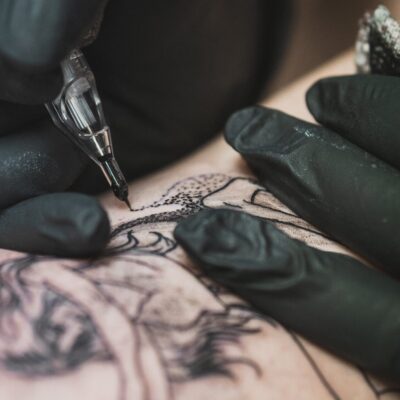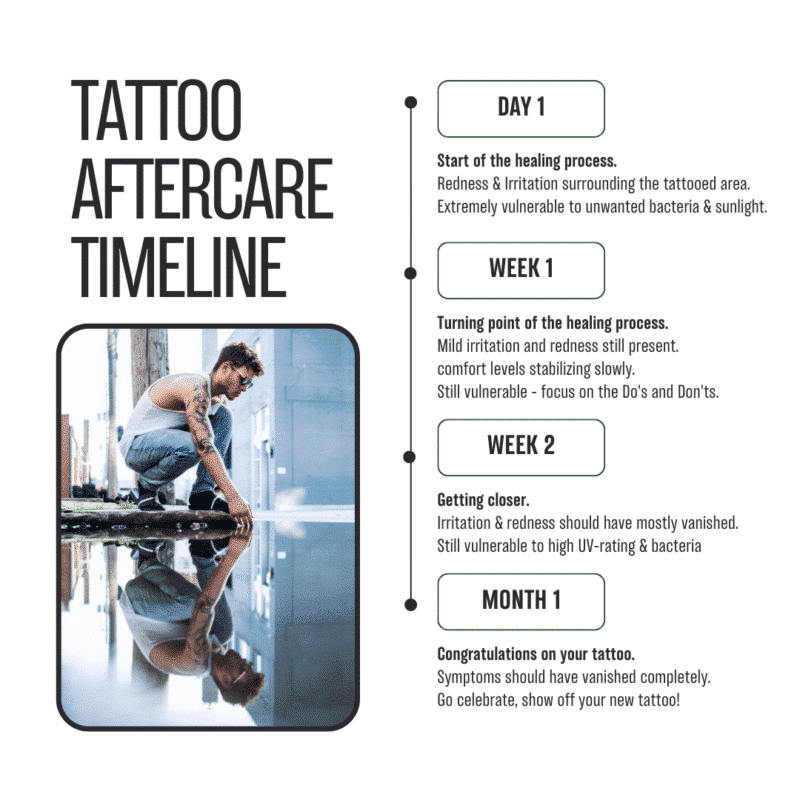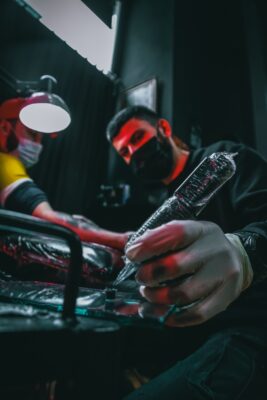Blog
The 9 Best Dos and Don’ts of Tattoo Aftercare

If you’ve been looking for a tattoo aftercare guide to help you with understanding the healing process for a tattoo, look no further, we will help you through some of the steps needed to keep your tattoo fresh. Remember that tattoo aftercare is essential to the healing process of tattoos, as well as being a set of rules that could make your tattoo just that little bit more healthy. Follow our Dos and Don’ts to tattoo aftercare, and make your masterpiece a reality.
The process of getting a tattoo
Decorative tattooing involves the process of inserting a pigment or dye into the dermis, which is a thick layer of tissue that forms the skin, with the intention to permanently dye an area of the skin with a personally desired design. Tattooing has been a practice since ancient times and it has become extremely widespread throughout the last thirty years. 10% of the general population in Western countries has a skin tattoo, while 25% between the ages of 18-50 have tattoos.
What is aftercare?
You might already know the answer to: what is tattoo aftercare? But it is still important to clarify what it actually means. Tattoo aftercare is the steps and precautions taken after getting a tattoo, with the intention of supporting the skins natural healing process by preforming various tacks, as well as staying clear of activities that might damage the tattoo.
Why aftercare for tattoos is important
The importance of tattoo aftercare and proper tattooing has never been more relevant, as the popularity of tattooing increases. Knowing the right steps to keep your tattoo healthy and intact is an essential part of getting a tattoo.
Improper guidance or totally neglecting to take care of a newly created tattoo could lead to an immense amount of side effects, as well as impairing the appearance of the tattoo itself. Here is a list of the most common side effects caused by improper caretaking of tattoos.
-
- Redness: A general redness surrounding the tattooed area is commonplace, in the first couple of days after getting a tattoo, as the skin has been under tension. But bear in mind that significant and prolonged redness might be a sign of a rash.
- Infection: A tattoo is similar to an open wound, as the process of tattooing is equal to thousands of pinpricks to the skin. Tattoos are therefore very vulnerable to infections, as well as other bacteria that might be damaging to the tattoo, while in the healing process.
- Impaired healing process: Correct care of a tattoo helps the tattoo healing process significantly, and not taking the right steps towards proper caretaking of a tattoo will lead to an impaired and slow healing process.
- Disformed tattoo appearance: The design and/or colour of the tattoo might change due to improper tattoo aftercare
Read the following article to learn more about the medical complications of tattoos
The Dos
Nothing is more important than keeping your tattoo fresh and healthy, to make sure your desired design becomes a reality. Which is why, we would love to share some of our most helpful tattoo aftercare Dos and Don’ts that can help you on your journey to a perfect tattoo healing process.
Try your best to keep every recommendation in mind while preparing for your own tattoo healing process. We suggest following as many of these Dos as possible, in addition to staying clear from the Don’ts.
Do wear airy clothes
-
A good way to enforce immediate tattoo aftercare, is to try and keep your attire airy and loose, with the intention of minimizing the amount of clothing touching the tattooed area. In addition, wearing tight fitted clothing might cause irritation around the tattooed skin, as well as heat which could generate sweat and damage the tattoo
Do keep your hands and skin clean
- Just like a wound, the tattoo is vulnerable to infection, and it is crucial to keep any uninvited bacteria away from the affected area. Not only are infections extremely irritating and uncomfortable, they can also damage the tattoo and the surrounding skin. In addition, using soaps to keep the skin clean is highly recommended and should be considered, whenever your hands have gotten even a little bit dirty.
Do keep yourself healthy
- Important to stay healthy and keep your diet intact, as it will be able to keep your immune system at an all time high, while the healing process is taking place.
Do consult your tattoo artist & dermatologist
- We strongly recommend consulting your local dermatologist, if you are skin sensitive or have previously experienced allergic reactions while getting a tattoo or in a similar. Allergic reactions can take many forms, but the most common reaction, is a red and itchy rash surrounding the tattooed area. If you have an allergic reaction, you should contact the doctor immediately. Read more about the effects of ink allergies: here
- We advise you to talk with your tattoo artist about their prefered healing methods, as they might differ from what you have heard or seen other do.
The Don’ts
Don’t do fitness
- Your body is going through a prolonged healing process and need all the resources and treatment in the world, to effectively heal and not damage the tattoo or skin while vulnerable. One of the things that could disturb the naturel healing process is sweat. Sweat can halt the process and cause various problems. For this reason, we recommend not doing any excessive training that might lead to sweating, this includes working out, fitness and other activities.
Don’t take extremely warm showers
- This is more of a tip to smoothen the tattoo healing process. Irritation can easily be caused due to taking extremely warm showers directly on the tattooed area.
- If you normally like to take piping hot showers, you might need to turn the temperature down a little bit.
Don’t be exposed to direct sunlight
- Tattoos are an extremely time and money heavy investment, so make sure that you don’t lose your focus, even after the tattoos is finished. Steps are still needed to make sure that your tattoo will turn out the intended way. Prolonged exposure to high ultraviolet radiation, or UVR for short, from the sun has been proven to have a negative effect on tattoos. Which is why you need to stay clear of any direct sunray, and make sure to cover up when the UVR-ratings is high. Some of the effects UVR can have on your skin is as follows:
- Tattoo ink will age and fade rapidly
- Slows the healing process of the tattoo down significantly
- Cause sunburn and flaky skin, that damages the tattoos design when removed.
- And many more.
- Keep in mind that, excessively avoiding sunlight is only necessary while the tattoo is still healing.
Don’t carelessly chose a tattoo artist
- Tattoo aftercare takes place even before the tattoo is even made, as it is important to make sure that you have a good and professional tattoo artist. Professional tattoo artist have the right tools and classification to properly take care of your tattoo. This includes having properly cleaned needles, and experience with keeping the skin clean throughout the entire process. In addition, poorly cleaned needles and tools will greatly increase the chance of an fungal infection.
- Take your time to research your local tattoo shops and artists. Don’t hesitate to ask them questions, if you are unsure about how they handle the tattooing process, as well as the tattoo aftercare process.
Don’t scratch your tattoo
- The skin surrounding the tattoo will have a tendency to become itchy and irritated, just like a normal wound. It is therefore immensely important to keep your fingers away from the tattooed area, as it would only make the itchiness worse and cause damage to the tattoo.
Tattoo Aftercare Timeline
It might be a little daunting to think of the entire healing process of your tattoo from the start. For the reason, we have decided to create a timeline which should hopefully answer some of your questions, such as, how long should you keep up tattoo aftercare? And How do I know if my tattoo is completely healed? This timeline should also help you with understanding what to expect from the different days and weeks

What should you do in case of complaints?
If you experience extended redness or a crust forming around the tattooed area, you should immediately contact your tattoo artist or visit your local doctor.
Extended redness or a crust forming is usually due to insufficient care of the tattoo and not taking the right precautions after getting a tattoo.
Other exciting content
To learn more about:
Take a look at our other blog postsby scrolling left and right at the bottom.
Don’t forget to follow us on Facebook & Instagram




